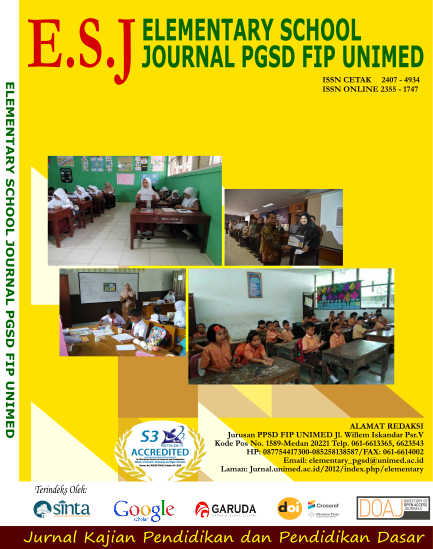Kemampuan Literasi Matematika Mahasiswa Pendidikan Guru Sekolah Dasar Berbasis PMRI
DOI:
https://doi.org/10.24114/esjpgsd.v13i2.43197Abstract
Pendidikan Guru Sekolah Dasar (PGSD) merupakan jurusan di perguruan tinggi yang bertugas mencetak calon guru Sekolah Dasar (SD), maka dari itu sangat penting sekali menyiapkan kualifikasi guru SD yang sesuai dengan tuntutan AKM. Salah satu pendekatan yang bisa dilakukan untuk menumbuhkan keterampilan pemecahan masalah, berpikir kritis, kreatifitas, koordinasi dengan sesama serta fleksibilitas kognitif adalah pendekatan dengan masalah kontekstual atau masalah sehari-hari atau dalam matematika yakni PMRI (Pendidikan Matematika Realistik Indonesia). Peneliti melakukan penelitian yang bertujuan untuk mendeskripsikan kemampuan literasi matematis siswa Pendidikan Guru Sekolah Dasar berbasis Pendidikan Matematika Realistik. Penelitian ini menggunakan metode deskriptif kualitatif untuk menggambarkan kondisi dan fakta di lapangan selama proses penelitian, yang dijelaskan secara kata-kata atau deskriptif. Berdasarkan data yang telah diolah, diperoleh hasil bahwa kemampuan literasi matematis siswa pendidikan guru sekolah dasar kurang memadai.Keywords: Literasi Matematika, Pendidikan Guru Sekolah Dasar, Pendidikan Realistik Matematika.References
Abdullah, R. (2016). Pembelajaran Dalam Perspektif Kreativitas Guru Dalam Pemanfaatan Media Pembelajaran. Lantanida Journal, 4(1), 35“49. http://dx.doi.org/10.22373/lj.v4i1.1866
Afriyani, D., Sa™dijah, C., Subanji, S., & Muksar, M. (2018). Characteristics of Students™ Mathematical Understanding in Solving Multiple Representation Task based on Solo Taxonomy. International Electronic Journal of Mathematics Education, 13(3), 281“287. 06-3030. 2018, Vol. 13, No. 3, 281-287 https://doi.org/10.12973/iejme/3920
Baiduri. (2019). Strategi Literasi dalam Pembelajaran Matematika Pada Era Industri 4.0. Journal of Mathematics Education, Science and Technology, 4(1), 77“94. http://dx.doi.org/10.30651/must.v4i1.2782
Cukurova, M., Luckin, R., Millán, E., & Mavrikis, M. (2018). The NISPI framework: Analysing collaborative problem-solving from students™ physical interactions. Computers and Education, 116, 93“109. https://doi.org/10.1016/j.compedu.2017.08.007
Daulay, K. R., & Ruhaimah, I. (2019). Polya theory to improve problem-solving skills. Journal of Physics: Conference Series, 1188(1). https://doi.org/10.1088/1742-6596/1188/1/012070
Duyen, N. T. H., & Loc, N. P. (2019). Developing Primary Students™ Understanding of Mathematics Trough Mathematization: A case of Teaching the Multiplication of Two Natural Numbers. European Journal of Educational Research, 8(3), 753“761. https://doi.org/10.12973/eu-jer.11.1.1
Fery, M. F., Wahyudin, & Tatang, H. (2017). Improving primary students mathematical literacy through problem based learning and direct instruction. Educational Research and Reviews, 12(4), 212“219. http://dx.doi.org/10.5897/ERR2016.3072
Hasanah, S. I., Tafrilyanto, C. F., & Aini, Y. (2019). Mathematical Reasoning: The characteristics of students™ mathematical abilities in problem solving. Journal of Physics: Conference Series, 1188(1), 0“8. https://doi.org/10.1088/1742-6596%2F1188%2F1%2F012057
Kebudayaan, K. P. dan. (2020). Penyelenggaraan Asesmen Nasional Tahun 2021.
Ketaren, M. A., Armanto, D., & Simbolon, N. (2022). Development of Numeration Literacy Module Based on Realistic Approach for Elementary School. ESJ: Elementary School Journal Jurnal Kajian Pendidikan Dasar, 12(4), 340“347. https://doi.org/10.24114/esjpgsd.v12i4.40722
Khaerunisak, K., Kartono, K., Hidayah, I., & Fahmi, A. Y. (2017). The Analysis of Diagnostic Assesment Result in Pisa Mathematical Literacy Based on Students Self-Efficacy in Rme Learning. Infinity Journal, 6(1), 77. http://dx.doi.org/10.22460/infinity.v6i1.236
Kusuma, D., Sukestiyarno, Y. L., Wardono, & Cahyono, A. N. (2019). The Characteristics of Mathematical Literacy Based on Students™ Executive Function. European Journal of Educational Research, 8(3), 753“761. https://doi.org/10.12973/eu-jer.11.1.193
Kuswidyanarko, A. (2017). The Analysis of Mathematical Literacy on Realistic Problem-Based Learning with E-Edmodo Based on Student™s Self Efficacy. Journal of Primary Education, 6(2), 103“113. https://doi.org/10.15294/jpe.v6i2.17556
Matthew B. Miles, A. Michael Huberman, J. S. (2014). Qualitative Data Analysis: A Methods Sourcebook (Third). SAGE.
Murdiyani, N. M. (2018). Developing non-routine problems for assessing students™ mathematical literacy. Journal of Physics: Conference Series, 983(1), 0“6. https://doi.org/10.1088/1742-6596/983/1/012115
Nehru, N. A. (2019). Asesmen Komptenesi Sebagai Bentuk Perubahan Ujian Nasional Pendidikan Indonesia: Analisis Dampak dan Problem Solving Menurut Kebijakan Merdeka Belajar. Journal of Chemical Information and Modeling, 53(9), 1689“1699.
Noviani, M. R., & Surya, E. (2017). Analysis of Student Difficulties in Mathematics Problem Solving Ability at MTs SWASTA IRA Medan. International Journal of Sciences: Basic and Applied Research (IJSBAR), 33(3), 63“75.
Psycharis, S., & Kallia, M. (2017). The effects of computer programming on high school students™ reasoning skills and mathematical self-efficacy and problem solving. Instructional Science, 45(5), 583“602. https://psycnet.apa.org/doi/10.1007/s11251-017-9421-5
Putra, L. V., Suryani, E., & Oktaviani, T. S. L. (2022). The Influence of Problem-Based Learning Assisted by Mathica to Improve The Problem-Solving Ability of Elementary School Students. ESJ: Elementary School Journal Jurnal Kajian Pendidikan Dasar, 12(4), 359“365. https://doi.org/10.24114/esjpgsd.v12i4.39868
Rizki, L. M., & Priatna, N. (2019). Mathematical literacy as the 21st century skill. Journal of Physics: Conference Series, 1157(4). https://doi.org/10.1088/1742-6596/1157/4/042088
Tambunan, H. (2019). The Effectiveness of the Problem Solving Strategy and the Scientific Approach to Students™ Mathematical Capabilities in High Order Thinking Skills. International Electronic Journal of Mathematics Education, 14(2), 293“302. https://doi.org/10.29333/iejme/5715
Tambunan, T. A., Sipayung, R., Pangaribuan, J. J., & Tanjung, D. S. (2022). Pengaruh Model Pembelajaran Creative Problem Solving Terhadap Hasil Belajar Matematika pada Siswa Kelas VI SDN 064033 Kwala Bekala. ESJ: Elementary School Journal Jurnal Kajian Pendidikan Dasar, 12(3), 227“236.
Umbara, U., & Suryadi, D. (2019). Re-interpretation of mathematical literacy based on the teacher™s perspective. International Journal of Instruction, 12(4), 789“806. https://doi.org/10.29333/iji.2019.12450a
Yanti, D., & Yunita, H. (2020). Kecemasan Matematika Dan Self Efficacy Dalam Melakukan Pembuktian Matematika. Journal of Mathematics Science and Education, 2(2), 68“79. http://dx.doi.org/10.31540/jmse.v2i2.915
Zubaidah, S. (2016). Ketrampilan Abad 21: Ketrampilan yang Diajarkan Melalui Pembelajaran. Seminar Nasional Pendidikan, 2, 1“17.
Downloads
Published
Issue
Section
License
Copyright (c) 2023 Ika Rahmawati

This work is licensed under a Creative Commons Attribution 4.0 International License.

Elementary School Journal PGSD FIP UNIMED is licensed under a Creative Commons Attribution 4.0 International License.
ESJ : Elementary School Journal PGSD FIP UNIMED by PGSD Universitas Negeri Medan. p-ISSN : 2407-4934 | e-ISSN : 2355-1747

